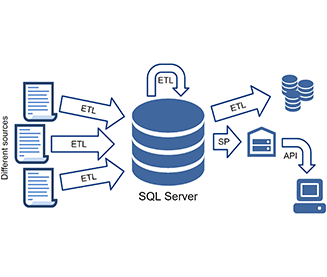- Introduction to Database.
- Relational Database Theory.
- Database design.
- Uses of Database.
- Environment Overview.
- Data Management System.
- Connecting to Database.
- Introduction to SQL.
- Installing SQL server.
- Schema.
Courses Description
SQL stands for Structured Query Language, the standard language for relational database management systems. It is one of the most widely used programming languages in business. Proficiency in SQL is essential for any technical and non-technical roles like database administrators, data analysts, business intelligence, sales, and support. Learn the fundamentals of database and SQL queries to interact with databases. Connecting to the databases like SQL Developer, Oracle, MySQL, and SQL Server. Gain knowledge of how to integrate and manipulate complex SQL data sets, break large data sets down into manageable subsets for further processing, and derive challenging business calculations through SQL queries.
| Date | Days | Timings |
|---|---|---|
| 17-Jun-2024 | Monday (Monday-Friday) |
08:00 AM (IST) |
| 12-May-2024 | Wednesday (Monday-Friday) |
08:00 AM (IST) |
| 15-Jun-2024 | Saturday (Saturday-Sunday) |
11:00 AM (IST) |
| 15-Jun-2024 | Saturday (Saturday-Sunday) |
11:00 AM (IST) |
Course content
-
Database
-
SQL Syntax
-
Data Definition Language (DDL)
-
Data Manipulation Language (DML)
-
Transaction Control Language (TCL)
- Commit and Rollback statements.
- Implicit and Explicit Transactions.
-
Single Row Function
-
Analytical Function
-
Data Retrieve from Multiple Tables
-
Indexes and Views
-
Materialized View
-
Data Control Language
-
Data Dictionary Objects
-
Data Integrity and Constraints
-
Query Execution Plans
-
Advanced Concepts
Why Choose Tops Technologies ?
Practical Learning
Experienced Trainers
100% Career oriented
Certification
Why you should learn SQL Course?
- SQL professionals earn competitive salaries, with entry-level positions starting around $70,000 annually in the US.
- SQL proficiency can lead to career advancement; 80% of Fortune 500 companies use SQL databases.
- SQL is crucial for data analysis and business intelligence, allowing professionals to extract insights efficiently.
- SQL databases handle massive amounts of data; for example, Facebook's MySQL database manages over 2.5 billion users.
- SQL databases are scalable; Amazon's Aurora MySQL can handle up to 64 TB of data per instance.
- SQL is fundamental for web development; 5% of web applications interact with SQL databases.
- SQL databases handle massive amounts of data; for example, Facebook's MySQL database manages over 2.5 billion users.
Highlights of Our SQL Course
- Learn SQL basics through 30+ hours of comprehensive video lectures.
- Practice with 50+ real-world SQL exercises to reinforce learning.
- Gain proficiency in SQL queries, used in 80% of data-related job roles.
- Access to a dedicated SQL practice environment for hands-on experience.
- Understand database design principles with 20+ practical examples.
- Master data manipulation with SQL, crucial for 90% of data-driven decisions.
- Join a community of 10,000+ learners benefiting from our SQL course.
- Receive personalized feedback on 100+ SQL assignments to track progress.
About course:
Other includes:
- Full lifetime access
- Downloadable resources
- Certificate of completion



